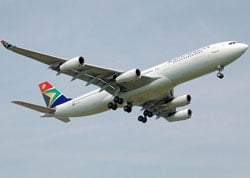
Top stories






More news


Marketing & Media
Ads are coming to AI. Does that really have to be such a bad thing?














Government has once again come to the aid of the carrier, this time with a cash injection of R6bn. In the 2011 financial year SAA experienced a R202m operational loss, though this was an improvement on the R970m operational loss in the previous year.
Many observers have said the payment by treasury is anticompetitive and goes against earlier vows by government that it would never again bail out the national carrier. However, government has repeatedly stated that the money is not a bailout but a recapitalisation, since, according to SAA CEO Siza Mzimela, the national carrier was never properly capitalised to begin with.
Last week British Airways' GM for Europe & Africa, Gavin Halliday, and Lufthansa Airlines' new vice-president, Carsten Schaeffer, visited SA. The two were here on unrelated business; British Airways was celebrating its 80th year of flying in SA and Schaeffer was visiting the country as part of his induction tour.
Some commentators have called either for the privatisation of SAA or for it to be allowed to suffer the same difficulties experienced by its competitors which can't rely on government assistance.
Halliday spoke diplomatically when asked about the strategy of SAA, declining to refer to a particular airline. However, his sentiments were clear. "I am a great advocate of competition," he says. "If you look at [cases] where market forces have been allowed to prevail, the customer has been the arbiter of what has succeeded, and a wider choice has been the result.
"British Airways was privatised in the mid-1980s. Today the airline can fund its own capital programmes. We are investing £100m in the refurbishment of the first-class facilities in our existing fleet and are introducing six new Boeing 777300s. This must say something about privatisation," he says.
Cost pressures continue to face all airlines. In SA, airport tariffs have been increased dramatically at a time when fuel prices are also higher.
Schaeffer says the fuel price rise alone has pushed up Lufthansa group's costs by à800m over the past year. As a result Lufthansa is struggling to meet a profit margin of 5%.
The oil price has fallen to just below US100/barrel after peaking at US$123 in March, but Schaeffer says the environment is still tough and in some cases government assistance may be necessary.
"All carriers suffer when fuel prices go up," he says. He explains that the price fluctuations of petrol for passenger cars are relatively mild compared with the changes in air kerosene. "This is because the capacity to refine the fuel is very limited and air travel is a growth industry where demand is high."
The latest statistics from the International Air Transport Association for April showed a 7,4% increase in demand for air travel globally above the same month in 2011. This was mostly driven by business from the Middle East, which showed growth of 16%.
Africa expanded by 7% while North America and Europe grew least, only 1,6% and 5,9% respectively. Yet the highest average load factors or occupancies were in European (80,7%) and North American (80,8%) airlines, indicating higher efficiencies on existing flights. African carriers experienced the lowest load factors (65,9%), representing a serious threat to margins.
"Air travel is a key component [of transport in] any country," Schaeffer says. "It should be in the best interest of the SA government to support SAA in providing transportation in the region as well as intercontinentally.
"[Countries in] the Middle East have a more integrated approach to air travel. They see airlines, airports, air traffic control and hotels as a single entity, whereas in SA and Germany they are independent of each other," he says.
Lufthansa was state-owned until 1997, when it was privatised. It receives no government support. In the next two to three years the airline will invest à9bn in new aircraft, and on-board products will be revamped.
Source: Financial Mail via I-Net Bridge

For more than two decades, I-Net Bridge has been one of South Africa’s preferred electronic providers of innovative solutions, data of the highest calibre, reliable platforms and excellent supporting systems. Our products include workstations, web applications and data feeds packaged with in-depth news and powerful analytical tools empowering clients to make meaningful decisions.
We pride ourselves on our wide variety of in-house skills, encompassing multiple platforms and applications. These skills enable us to not only function as a first class facility, but also design, implement and support all our client needs at a level that confirms I-Net Bridge a leader in its field.
Go to: http://www.inet.co.za